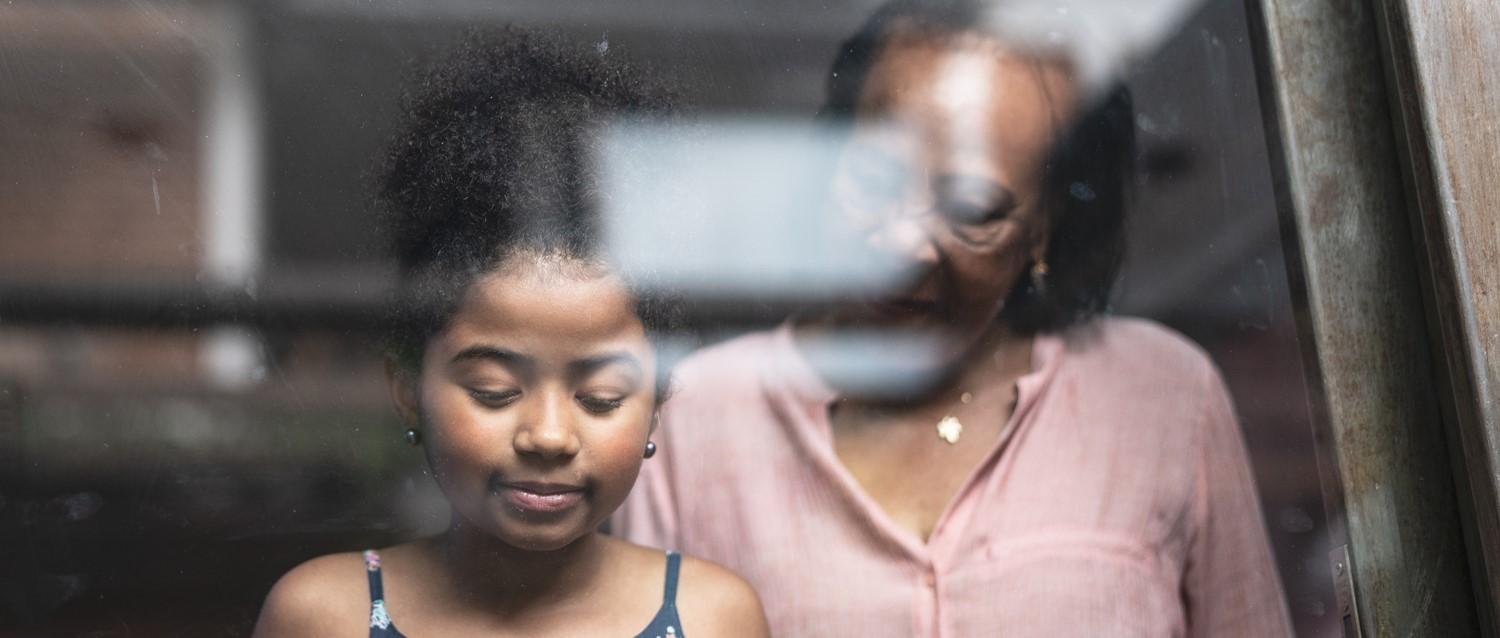
How to spot the signs of anxiety in kids
Peer reviewed by Dr Sarah Jarvis MBE, FRCGPLast updated by Gillian HarveyLast updated 14 Oct 2019
- DownloadDownload
- Share
As adults, we all feel a little anxious or worried from time to time. So it's natural that our children feel that way sometimes too. It's important to be able to spot the signs so that we can respond appropriately, but also take action if there may be a more serious underlying problem.
In this article:
Whereas, as adults, we can usually recognise the bodily sensations and thoughts that come with anxiety, it can be harder for children to know exactly what it is they're feeling. So if a child goes through a period of anxiety, or we feel they may have a tendency to worry too much, what steps should we take - and when should we seek help?
Continue reading below
Signs and symptoms
It's important that, as adults, we take notice of any changes in behaviour or unusual patterns.
"Children will often know that something isn't right, but will channel it into a tummy ache or say they're feeling very tired," explains Dr Sharie Coombes, Child, Adolescent and Family Psychodynamic Psychotherapist.
"You might find they've lost their confidence a bit, that they want to avoid going to certain places or that they get angry more easily than usual. You might notice they seem overwhelmed, become withdrawn or seem to be having trouble breathing steadily," she says.
"It can be easy to dismiss such behaviour as attention-seeking or playing up but it's important to remember that behaviour is a form of communication."
Patient picks for Child mental health and behaviour

Children's health
How to help your child with back-to-school anxiety
After the freedom of the summer holidays, it’s normal for kids to be reluctant to head back to the classroom. But sometimes, not wanting to go back to school can be a sign of anxiety. Here we look at ways for parents to ease the transition by recognising the signs of stress, providing support and using strategies to settle them back into school life.
by Lydia Smith

Children's health
Anxiety in children
It would be wonderful if every child could have no worries or fears. Unfortunately children and young people can be just as likely to worry as adults. It is important to recognise when your child is anxious and try to help them learn to manage their worries before they start to affect their daily lives.
by Dr Hayley Willacy, FRCGP
Talking about it
Whilst an anxious child will usually realise that something is wrong, they may not have the emotional maturity or language to talk about it. However, it's important to communicate to your child that you've noticed things aren't quite right. Coombes recommends adopting a 'bitesize' approach - looking at small parts of the overall problem so that children can cope.
"You might say something along the lines of, 'I noticed it was difficult for you to come swimming yesterday, why do you think that was?'" she advises.
"Children love to be noticed, and mentioning behaviour in this way enables you to address the issue in an unthreatening way. What you're doing in that moment is metabolising what’s going on and mirroring it kindly back to them."
Other children, who are perhaps older or find it easy to express themselves, may benefit from more direct questioning. "You could try asking them to tell you how they're feeling at the moment," says Coombes. "It all depends on how in touch they are with their feelings and their ability to talk about their emotions."
Continue reading below
Sticking to boundaries
When a child is suffering from anxiety, it's natural to want to be gentle with them. However, it's also important that parents keep boundaries of expected behaviour in place. "Boundaries are there for a reason," says Coombes. "If suddenly when they act out, you act as if it's OK, that can make them feel really upset."
Of course, keeping children to boundaries doesn't have to mean expressing anger. "You can reinforce boundaries in a sympathetic way," explains Coombes. "Tell them you can see that it's hard for them at the moment, and ask if there's anything they can think of that might help them to stick to the rules."
However, whilst we may know the right way to react, Coombes acknowledges that it can be difficult to always get it right, especially when a child is being difficult. "It's important to remember that none of us is perfect," she says. "There will be times when you're rushing to get the children out of the door on time - we can't always have the right reaction when we're under pressure."
Seeking support
Once we've identified that our child is anxious in certain situations, or feeling generally worried about things, it's important we take action in order to help them feel better. However, this doesn't necessarily mean they will need specialist support.
In the first instance, Coombes advises talking to the child and seeing if there's a solution you can come up with together - trying different strategies to try to address the problem and help the child to move forward.
It's also important to look at lifestyle factors which may contribute to or exacerbate negative feelings. Have a think about your child's diet, their exercise levels and the amount of screen time they are given and make adjustments. Coombes also recommends encouraging them to spend time outdoors when possible: "Spending time outdoors is so great for the brain and the body," says Coombes. "In the outdoors we feel connected to something bigger than ourselves. Kids are naturally in awe of nature and can respond really well."
If your child's anxiety continues, or is having a serious impact on your child's or your family's life, it may be time to see your GP for a referral to a psychologist or other suitable professional. "Usually, I'd advise to wait two or three months," says Coombes. "If you try all the things you can think of during that time and things haven't shifted, it's time to see someone."
However, sometimes a more early intervention might be necessary. "If you feel out of resources as a parent, or if a child's avoidance starts to get in the way of family life, then might be the time for some additional support."
It's important to remember that anxiety in children is extremely common - and often an understandable reaction to the uncertainties and challenges of childhood. It can be stressful to watch someone you love struggle, but it's important to remember that most children will respond well under parental guidance. If your child does need additional support, it doesn't necessarily mean they will struggle with the problem throughout their life - and even acute anxiety can be managed effectively with the right intervention.
Article history
The information on this page is peer reviewed by qualified clinicians.
14 Oct 2019 | Latest version

Ask, share, connect.
Browse discussions, ask questions, and share experiences across hundreds of health topics.

Feeling unwell?
Assess your symptoms online for free